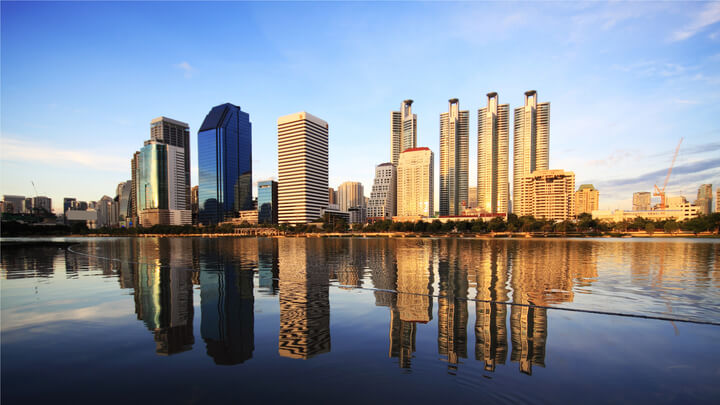How to open a bank account online in Australia: Eligibility, steps, and top providers
Wondering if you can open a bank account online in Australia? Discover the options available and how to open a bank account online.

If you know you’ll be staying in Thailand for an extended period of time you’re probably thinking of opening a foreign bank account to avoid excessive bank & ATM fees. Thailand provides a wide array of options in terms of banking and financial structures.
The good news is that with the huge draw of tourism in Thailand, a significant portion of the population is comprised of expats, so the process of opening a bank account is fairly well established.
Depending on whether you already have the required documents, opening a bank account in Thailand may take some time. To get started, you’ll need:
Some banks may ask for more:
For expats, opening a bank account in Thailand can be a long, drawn out process as much of it depends on whether or not you have a work permit. If you don’t have a work visa, it may limit your options in terms of banks. However, there are still many banks which will allow you to open a current account without one, such as Bangkok Bank which is a main bank in Thailand.
If you already have your work permit, a non-immigrant B visa, a non-immigrant O-A visa, or a non-immigrant visa for business, then you should be eligible to open an account with most banks. From there, a passport may be all you need to begin the process.
Ensuring you’ve done your research on the requirements can go a long way; in some cases bank employees aren’t familiar with eligibility for expats wishing to open accounts. You may want to come prepared with a list of the requirements to share with the bank employee in order to speed up the process. Any given bank in Thailand will photocopy your documents and require your signature on a handful of forms.
To open a bank account in Thailand, you generally must be physically present and have a bank official witness you signing the official papers.
As stated above, many banks require you to be present in order to open an account, but major banks such as Bangkok Bank will automatically give you online banking privileges as soon as you open an account with them. Moreover, if you have a work permit or possess a long-stay visa, you can apply for a wider range of services such as a current account (checking account). This will come with the perks of internet banking as well as online international funds transfer services.
Many expats feel more secure when banking with a larger bank or banks with a longer history. Though Bangkok Bank is the largest and one of the most reliable banks in Thailand and serves thousands of expats, many of the main banks in Thailand - Kasikorn Bank, Siam Commercial Bank (SCB), and Krungsri Bank - all have branches throughout the country. Most have strong reviews in terms of customer service in addition to offering various financial packages.
The following are popular banks to consider banking with:
Fees will be different in every bank and can include a variety: yearly account fees, account cancellation fees, in addition to card replacement fees. If your bank of choice offers it, interest earned per year will also vary.
ATM withdrawal free and conversion rate fees are typically waived if you use your bank’s ATM. If you don’t have a work permit or you know you won't be staying in Thailand for an extended period of time (i.e. between 3-7 months), some banks may be able to waive some of the fees.
It really is to your advantage to open a local account as it’s common for ATMs to charge a steep withdrawal fee when using a foreign card. Many banks in Thailand will charge you or require a certain amount of Thai Baht to open an account. However, if you haven’t opened your local account yet and are planning to withdraw money in Thailand, you can often avoid ATM withdrawal fees by going into the bank branch with your form of identification and requesting a withdrawal.
Fees for transferring money outside of Thailand vary bank to bank, but most banks charge a minimum of 150 baht. Others, like Kasikorn Bank, may charge a fee if you visit the bank to do your transfer, but no fee if you complete the transaction online. These charges are largely unavoidable if you use banks to transfer money abroad, but if you transfer money often you’ll want to research which banks offer the best rates.
If you’re receiving money in Thailand, rather than sending it, charges for incoming foreign transfers may cost at least 500 baht from your bank, and there are often additional fees with the original sending and intermediary banks when they send these international transfers (generally via a method called SWIFT).
A cheaper solution, if you’re looking to fill up your new Thai bank account from overseas, is Wise. Not only does Wise use the real mid-market exchange rates (meaning that, unlike with regular bank transfers, there’s no hidden markup on the currency conversion rate), but because your money is received and sent via local bank transfers in both Thailand and your home country, that means those unpleasant international fees magically disappear.
All in all, opening a bank account in Thailand should be a fairly straightforward process. Having the right documents ready, you can hopefully open an account without too much hassle.
*Please see terms of use and product availability for your region or visit Wise fees and pricing for the most up to date pricing and fee information.
This publication is provided for general information purposes and does not constitute legal, tax or other professional advice from Wise Payments Limited or its subsidiaries and its affiliates, and it is not intended as a substitute for obtaining advice from a financial advisor or any other professional.
We make no representations, warranties or guarantees, whether expressed or implied, that the content in the publication is accurate, complete or up to date.

Wondering if you can open a bank account online in Australia? Discover the options available and how to open a bank account online.

Compare the best high-interest savings accounts in Australia. Our guide breaks down interest rates, and fees to help you find an account to grow your savings.

Looking for how to open a bank account with Virgin Money in Australia? We’ve got you covered. Here’s the process, fees and what you need to know.

Learn how to close your Revolut Australia account. The steps, options and important need-to-knows before your begin.

If you’re a student juggling study alongside work and social commitments, ensuring you have reliable and easy access to your money is essential. Choosing a...

Coming into student life something you might not think to address straight away is your banking. Many Australian banks offer accounts designed for students,...